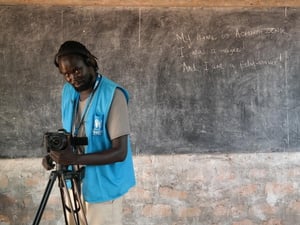UNHCR-NGO Toolkit for Practical Cooperation on Resettlement: 1. Operational Activities – Identification and Referral of Refugees in Need of Resettlement: Tools
UNHCR-NGO Toolkit for Practical Cooperation on Resettlement: 1. Operational Activities – Identification and Referral of Refugees in Need of Resettlement: Tools
a) Identification Tools
- UNHCR Heightened Risk Identification Tool (HRIT) and User's Guide
See "Participatory Assessments" for links to the HRIT Tool and User's Guide.
- Sample NGO identification tools
The Identification, Assessment and Referral Tool (IART) is used to assess the vulnerability of refugee households and determine if they should be enrolled in RefugePoint programs. The IART helps staff assess food security, shelter, health and mental health, protection concerns, and child protection issues. Households are given a categorical "score" in each area that indicates how safe and financially secure they are, and are referred for services as appropriate, which can include resettlement. The tool is used to measure stabilization, self-reliance and graduation over a period of 24 months.
- RefugePoint - Identification, Assessment and Referral Tool
b) Referral Tools
- Sample External Referral Forms
- A. External Resettlement Referral Form - French [from UNHCR Chad]
- B. External Resettlement Referral Form - Spanish [from UNHCR Venezuela]
- C. External Resettlement Referral Form - English [from UNHCR Ukraine]
- D. External Resettlement Referral Form - English [from UNHCR Russia]
- E. External Resettlement Referral Form - English [from UNHCR Pakistan]
- Other documentation used by UNHCR operations to assist in the referral process
The interaction and dialogue between UNHCR and NGOs should not end once a referral has been made. NGOs should expect and request feedback on the referrals, not just when additional information may be needed by UNHCR. Different methods of ongoing reporting/feedback are used around the globe. Some examples of successful feedback mechanisms include:
The spreadsheet was developed by the resettlement unit in 2014 in order to systematically manage NGO referrals and inquiries. Each month a spreadsheet with new referrals and inquiries tabs is created (see NGO Referrals month-year tab and NGO Inquiries month-year tabs in the below spreadsheet).
The spreadsheet starts its cycle at the NGO during the first week of the month and ends with an update from UNHCR at the end of the month.
When the NGO sends referral forms via e-mail to UNHCR, at the same time it completes and sends to UNHCR the case information in the referrals tab of the spreadsheet. The UNHCR referral focal point then provides feedback to the NGO on the referred cases after checking (and updated) ProGres and the physical file (including indicating a status in column G). Column G on the referral spreadsheet includes a drop-down menu with options: Granted RST IV (eligible for resettlement), NER (not eligible for resettlement), or Pending. The latter is used when a referred case is still in discussion or it has not yet been reviewed and assessed by UNHCR. The drop-down menu is a very helpful when preparing reports as the cases can easily be filtered by status.
For case inquiries, the NGO adds the case information in the inquiries worksheet without the need for referral forms or e-mails, and sends the spreadsheet to UNHCR. UNHCR then adds the relevant status of the case based on database and case file review and sends the updated inquiries spreadsheet back to the NGO.
Before personal or identifying information of a refugee is shared between and among UNHCR and NGOs, appropriate disclosure from the individual refugee must be obtained.
UNHCR would be grateful to receive copies of any adaptation or translation into other languages of referral tools that are being used by NGOs and/or UNHCR offices around the globe.
- NGO referral feedback/case tracking sheet
- Disclosure form
In order to facilitate the referral of refugees in need of possible resettlement consideration, UNHCR offices have created external referral forms used by NGOs in the field. Several examples, in different languages, are included below.
A repository for exchanging ideas on resettlement partnerships, June 2015
Operational Activities
Participatory Assessments Identification and Referral of Refugees in Need of Resettlement


